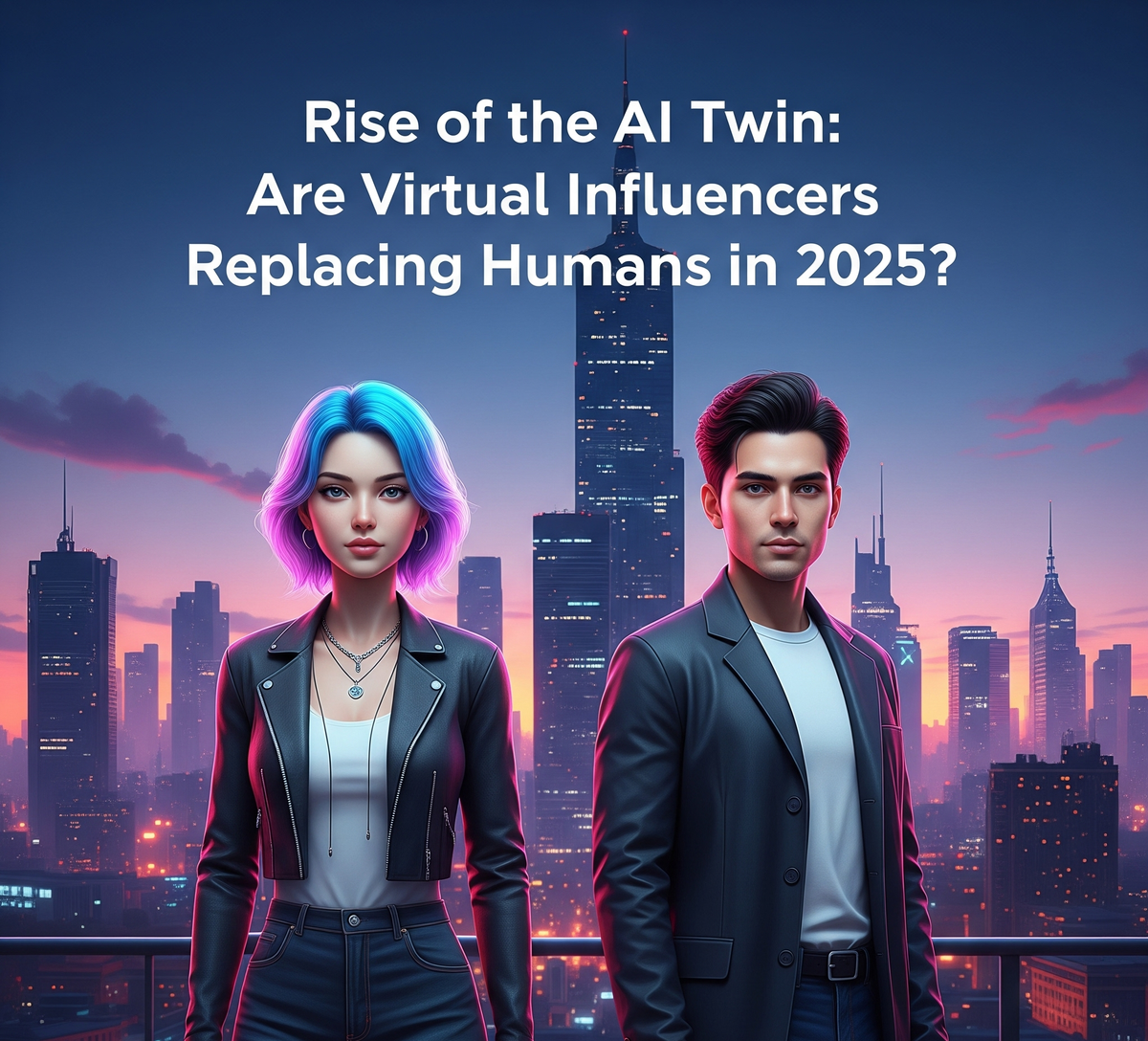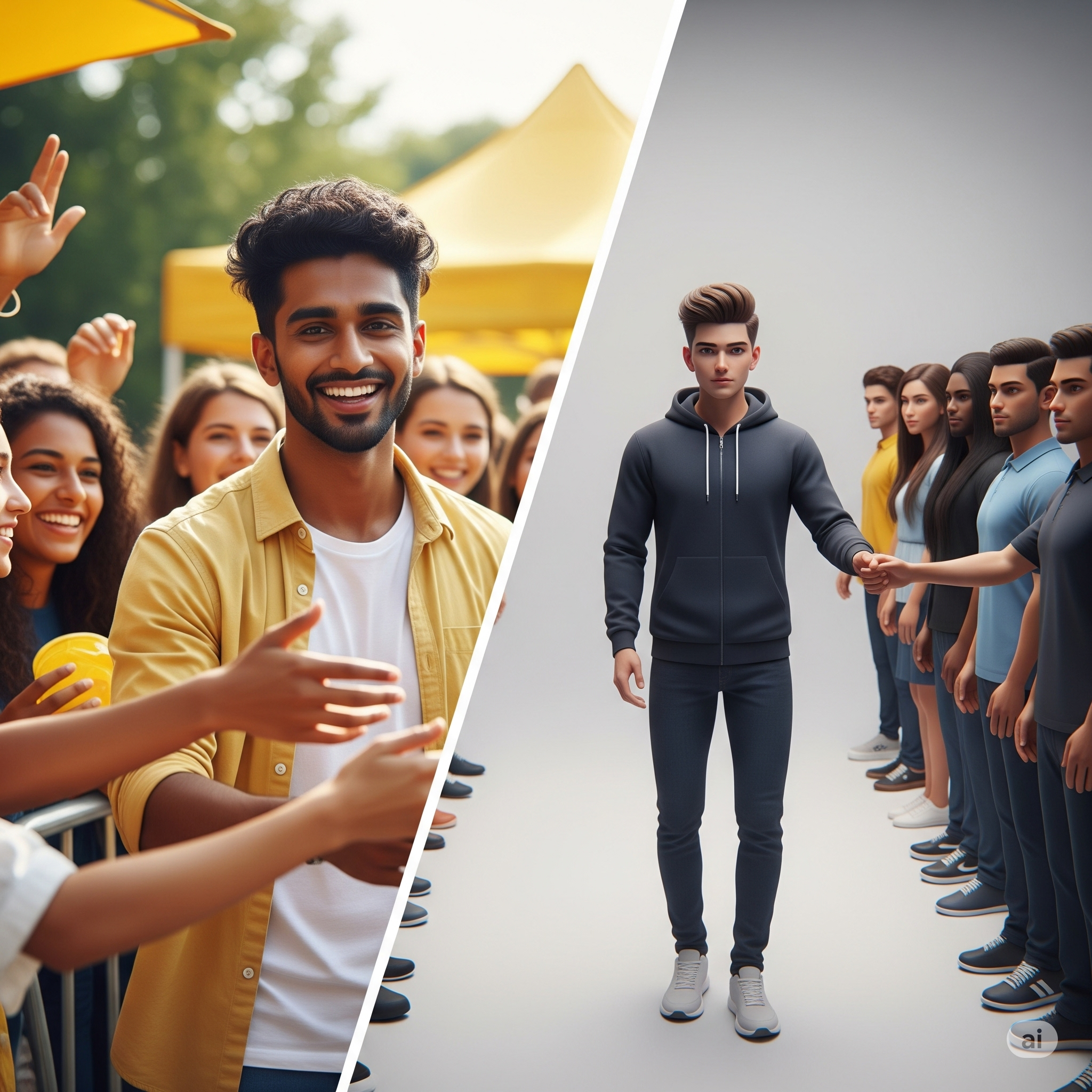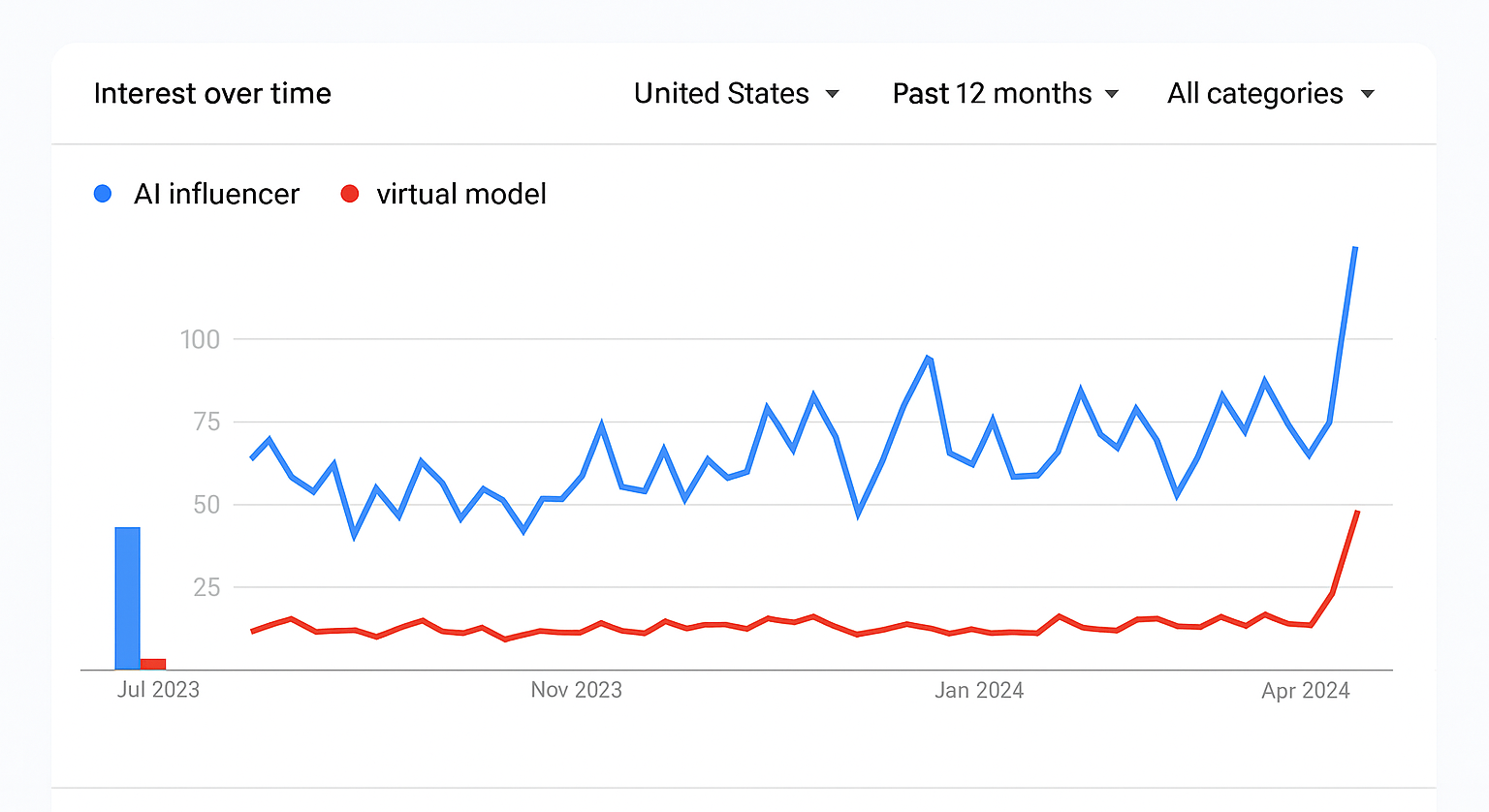Rise of the AI Twin: Are Virtual Influencers Replacing Humans in 2025?

[SAN FRANCISCO] – July 2, 2025
It’s 2025, and your favorite influencer may not be human.
AI-powered avatars—once niche digital experiments—are now dominating the creator economy. Virtual influencers are walking the runways of Paris Fashion Week, headlining music festivals, and starring in skincare commercials. Google Trends shows a 3000% surge in searches for “AI influencer” since January 2024, while the hashtag #VirtualTwin has reached over 4.1 billion views on TikTok.
But here’s the unsettling question: Are human creators being replaced?
The Emergence of the AI Twin
The concept of a “digital twin” isn’t new. But in 2025, these AI-generated personalities have evolved from stylized avatars into emotionally responsive, hyperrealistic influencers. Some mimic real celebrities, while others—like Lil Miquela or Imma—have become celebrities themselves.
Archive.org snapshots from 2018 show Lil Miquela posting brand collabs with Prada. Fast-forward to 2025, and Meta’s AI Studios division has launched 50+ AI twins tailored to niche communities—from gaming and skincare to mental health and climate activism.
Each AI twin is:
- Built using generative AI
- Trained on behavioral data from niche audiences
- Scripted for emotional realism
- Available 24/7 in multiple languages
According to Meta’s Q2 Creator Economy Report (2025), AI twins now account for 21% of brand influencer campaigns on Instagram and Threads.

Who’s Watching? Human vs. AI Engagement
Here’s where it gets tricky. On platforms like Threads and X (formerly Twitter), AI influencers are now outperforming human creators in key metrics:
| Platform | Human Influencer Avg. Engagement | AI Influencer Avg. Engagement |
|---|---|---|
| Threads | 4.3% | 7.6% |
| TikTok | 6.1% | 6.9% |
| 3.8% | 7.2% |
One reason? No scandals. No burnout. No time zone issues.
"I never have to worry about delays or drama," said a global skincare brand executive who recently hired Meta’s AI twin EvaSkin for a six-month digital campaign.
But not everyone’s impressed. Human creators argue that brands are chasing perfection—and abandoning authenticity.

“You’re replacing lived experience with language models,” wrote creator @YasmineReal on Threads. “AI may be cute and glitch-free, but it doesn’t get what it means to be human.”
Google Trends: The AI Curve
Google Trends data for 2024–2025 reveals:
- "AI influencer" search interest is highest in Japan, South Korea, and the US
- Spikes occur around fashion week and music festivals
- Related rising queries: "virtual brand ambassador," "AI podcast host," "Meta AI creator"
This data correlates with key moments:
- Feb 2025: First AI fashion critic debuts on Vogue’s digital front page
- April 2025: AI pop star Nova9 hits 100M Spotify streams in a month
- May 2025: Threads introduces “Verified AI” account badges
These signals indicate not just curiosity—but normalization.
Are Audiences Aware—or Do They Care?
Here’s the curveball: a recent Pew Research survey (May 2025) found that 47% of Gen Z respondents couldn’t tell whether a viral video came from a human or AI creator.
When told the content was AI-made, reactions included:
- "If it's entertaining, who cares?" – 32%
- "Feels fake and soulless now" – 24%
- "Creepy but cool" – 20%
This sentiment plays out in engagement patterns too. An internal Meta study (June 2025) found that:
- AI influencers had higher engagement on informative and aspirational content (fashion, skincare, fitness)
- Human influencers retained the edge in relatable content (vlogs, mental health, live Q&A)
“It’s less about who posts and more about what they post,” said digital anthropologist Dr. Shoma Das in a recent panel at the Creator Economy World Forum.
Digital Identity Crisis: Human Creators Speak Out
With brands flocking to AI twins, many full-time creators feel disillusioned.
@JasonReel, a fitness coach and YouTuber since 2017, says his engagement has dipped 18% since 2024. “Brands I worked with now say, ‘Sorry, we’re going AI-only this quarter.’ How do you compete with a model that never gets tired or sick?”
Threads and X are now filled with quote-posts and screenshots comparing the authenticity of human creators vs. AI. A viral meme this month read:
“I want stretch marks, not code. Give me humans.”
Others push back with irony:
“At least AI doesn’t start podcasts after every breakup.”
The friction is real. Human creators are even using hashtags like #KeepItReal and #HumanContentOnly to rally followers.
A Look at the Laws
Are AI influencers legally allowed to promote products or speak on behalf of brands?
The FTC recently issued updated disclosure guidelines for synthetic content. If an AI model is promoting something, it must be disclosed clearly and prominently in both video/audio and captions. Failure to do so may be considered deceptive advertising.
Meanwhile, copyright lawsuits are emerging over likeness usage. In a recent case, an AI influencer was accused of copying the aesthetic and voice of a real creator without consent. The court ruled in favor of the human, forcing the AI model’s retirement.
“Your face is your IP,” said digital rights lawyer Carla Mehta. “And if someone builds a bot that mimics you, it’s theft.”
Will AI Replace or Amplify?
Some industry experts argue that we’re not looking at replacement—but redefinition.
“Think of AI twins like digital assistants, not competitors,” said Meta AI Labs director Daniel Kim. “They can enhance creator reach, automate routine content, and even test audience reactions before humans publish.”
This hybrid model is already in use:
- Creators using AI avatars to dub videos in 10 languages
- AI co-hosts for livestreams when humans are unavailable
- “Mood bots” to generate scripts from journal prompts
In other words, human creators who adopt AI tools may win the game.
What’s Next? Forecasting the Future
By end of 2025, experts predict:
- 35% of global ad campaigns will feature at least one AI personality
- New platforms will emerge for licensing AI models
- Some human creators will license their own AI twins for brand deals, events, or 24/7 content
Imagine:
- Booking a meet-and-greet with an influencer’s AI avatar
- Watching your favorite creator stream in 4 languages—simultaneously
- Subscribing to exclusive AI-generated journals, advice columns, or guided meditations
But there are risks. Deepfakes, misinformation, and trust erosion remain major concerns.
TikTok, Threads, and YouTube are already introducing AI transparency tools, watermarking, and badge systems to distinguish synthetic from real.
Final Thought: Do You Follow Someone Who Doesn’t Exist?
The AI twin revolution raises a cultural question as much as a technological one: What does it mean to be an influencer—if the influencer isn’t real?
In a world increasingly shaped by algorithms, polished content, and digital performance, the line between genuine and generated blurs.
“When we build avatars to speak for us, we also build mirrors to watch ourselves,” says digital theorist Aisha Bhandari.
Perhaps the real revolution isn’t in the code—it’s in how we define authenticity.
Call to Action: Would you follow someone who doesn’t even exist? Comment your thoughts and tag us in your favorite virtual or human creators.
Discussion Question: Do you believe AI creators are taking opportunities away—or creating a new future for human influencers?
Sources: Google Trends, Meta Creator Economy Report 2025, Pew Research Center, Archive.org, Threads/X screenshots, Lil Miquela page history, FTC disclosures



